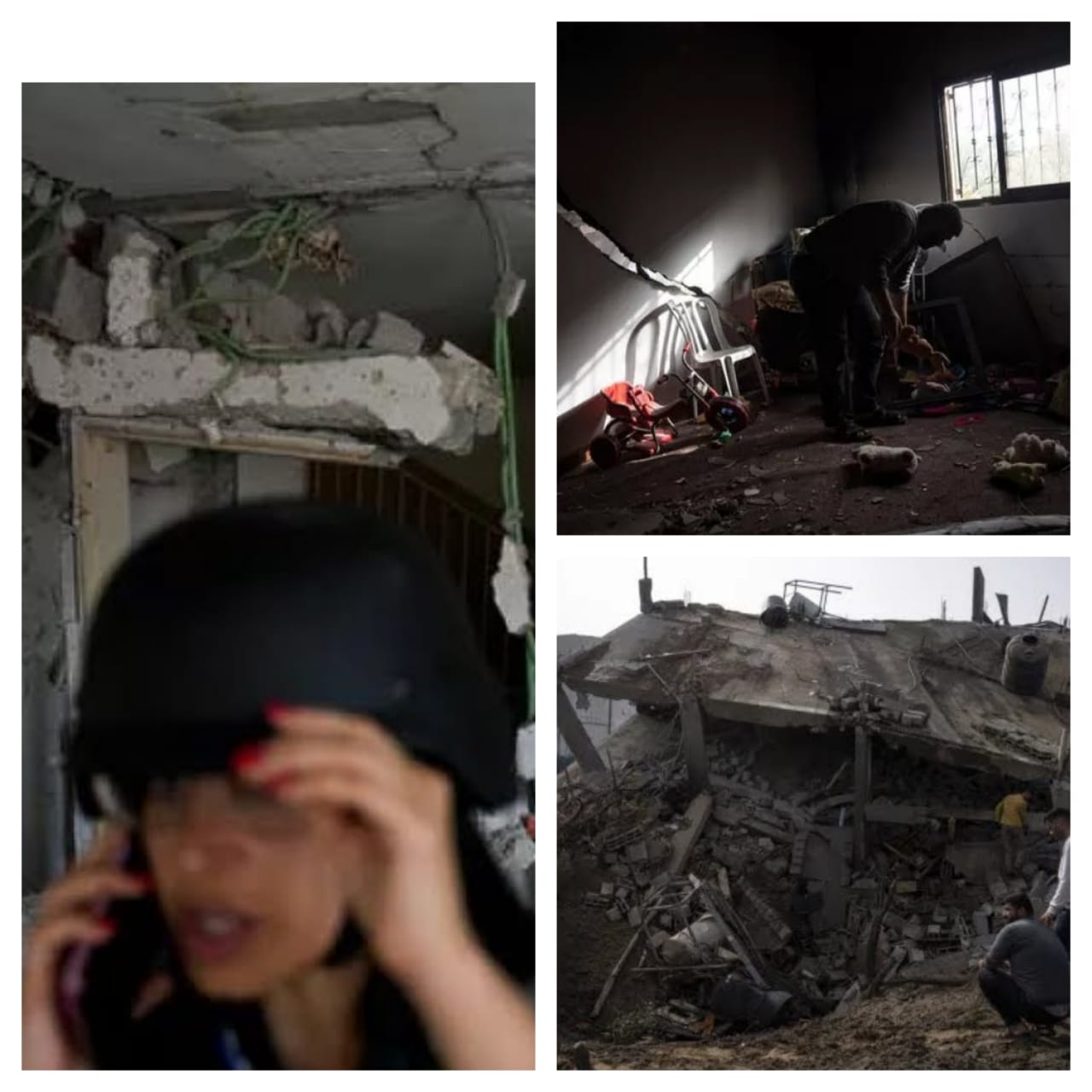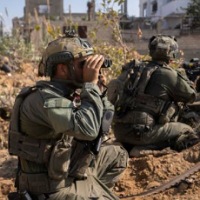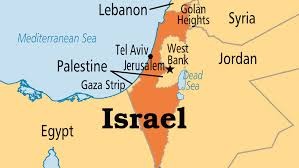International News
Israeli-Palestinian Confrontation Enters Third Day, Escalation Persists

In a protracted escalation of violence, Israel and Palestinian militants have engaged in their most intense confrontation in months, extending into a third consecutive day.
Israeli airstrikes have targeted locations in the Gaza Strip, while militants have responded by launching rockets towards Jerusalem and southern Israel.
As of Friday, there have been no immediate reports of casualties on either side. International mediators have been actively involved in pursuing a ceasefire to quell the ongoing hostilities.
The recent clashes have resulted in the loss of 31 Palestinian lives in Gaza, alongside the death of a 70-year-old individual in central Israel. The situation remains highly volatile as both sides grapple with the consequences of the conflict.
Hopes for a possible ceasefire in the Israel-Palestinian conflict were briefly dashed when a series of rockets were fired from the Gaza Strip, triggering warning sirens near Jerusalem.
The rockets broke a 12-hour period of calm, during which Egypt, Qatar, and the United Nations had been working towards a potential truce between the two sides.
Residents of Israeli settlements near Jerusalem were alarmed as explosions rocked the area, accompanied by billowing black smoke, following what appeared to be the interception of a missile.
One rocket struck an open field in the Bat Ayin settlement in southern Jerusalem, as confirmed by Josh Hasten, a spokesperson for the region.
Videos captured the tense scene as Israelis hastily exited their vehicles and took cover upon hearing the blaring of sirens. The anxiety-inducing moment serves as a stark reminder of the ongoing volatility in the region.
In response to what they perceive as targeted killings and persistent aggression against the Palestinian people, the “joint operations room,” a coalition of Palestinian factions based in Gaza, claimed responsibility for launching the rockets.
Their actions further illustrate the deep-rooted tensions and retaliatory dynamics fueling the conflict.
The office of Prime Minister Benjamin Netanyahu has confirmed that he is engaged in a security assessment amid the ongoing conflict.
The Israeli military has announced that its warplanes are targeting Islamic Jihad positions in response to the rocket attacks. The recent exchanges of fire have primarily involved Israel and Islamic Jihad, the second-largest militant group in Gaza after Hamas, who governs the territory.
According to Israeli sources, their strikes since Tuesday have resulted in the deaths of five senior Islamic Jihad figures.
In retaliation, Islamic Jihad has launched over 800 rockets towards densely populated areas of Israel. In response, Israel’s military has conducted airstrikes targeting at least 215 locations in Gaza.
According to Gaza’s housing ministry, the Israeli bombardment and shelling have resulted in the destruction of 47 housing units, rendering them completely uninhabitable, while 19 others have sustained severe damage.
As a result, 165 Palestinians have been left homeless due to the destruction of their homes. Additionally, nearly 300 other homes have suffered varying degrees of damage as a consequence of the attacks.
According to the United Nations humanitarian office, the current fighting in the Gaza Strip has resulted in the tragic loss of life for at least 31 Palestinians. Among the casualties are seven children and four women.
The Israeli military and the Palestinian Centre for Rights have confirmed that at least three of the children were killed as a result of misfired Palestinian rockets. Additionally, over 90 Palestinians have been reported wounded, as stated by the Palestinian health ministry.
The civilian fatalities have garnered condemnation from the Arab world and have raised concerns among the United States and European nations.
Throughout its past four conflicts with Hamas, Israel has faced consistent accusations of war crimes, primarily attributed to the significant number of civilian casualties and its utilization of heavy weaponry in the densely populated Gaza Strip.
In response to these allegations, Israel argues that Palestinian militant groups, including Hamas, exploit the presence of civilians by conducting their operations within residential areas, effectively using them as human shields.
Hamas, the de facto civilian government in Gaza, has been making efforts to uphold a truce with Israel while also striving to prevent further deterioration of the dire living conditions in the blockaded enclave.
Following the devastating 11-day war in 2021, which resulted in the loss of over 260 Palestinian lives, Hamas has been balancing the delicate task of maintaining stability and addressing the pressing needs of the population.
Hamas, the group that took control of Gaza in 2007, has refrained from direct involvement in the current round of fighting, as it did during a similar episode of violence last summer.
In a display of restraint, Israel has primarily focused its airstrikes on Islamic Jihad targets, indicating a more limited scope of engagement.
There were indications that both sides were nearing a ceasefire before the eruption of violence on Thursday. However, the relative calm observed on Friday raised hopes for progress in resolving the conflict.
According to Hamas officials, Egypt has intensified its diplomatic efforts to halt the fighting through active engagement and dialogue with both Hamas and Islamic Jihad.
Islamic Jihad figures have expressed conflicting views regarding the ongoing ceasefire talks. Senior official Ihsan Attaya voiced frustration on Friday, stating that the mediators had failed to provide any guarantees to address their concerns.
A key point of contention has been Islamic Jihad’s demand for Israel to halt its policy of targeted killings.
In contrast, Islamic Jihad political bureau member Mohamad al-Hindi sounded a more positive note.
Speaking from Cairo, where he traveled to engage in discussions regarding a ptential truce, he expressed hope that both sides would reach an agreement and honor it promptly.
He said ” I hoped both sides “would reach a ceasefire agreement and honour it today”
International News
ICC Issues Arrest Warrants For Israeli Prime Minister Netanyahu, Others
The International Criminal Court (ICC) has taken a historic step, issuing arrest warrants for Israeli Prime Minister Benjamin Netanyahu and former Defense Minister Yoav Gallant.
The charges include crimes against humanity and war crimes allegedly committed during Israel’s recent assault on Gaza.
In a detailed statement, the ICC accused the Israeli leaders of “intentionally and knowingly depriving the civilian population in Gaza of objects indispensable to their survival, including food, water, and medicine and medical supplies, as well as fuel and electricity.”
READ MORE: Osun Govt Decries Attempted Murder Of Park Mgt Chairman By Police
The ICC’s move marks a significant escalation in international scrutiny of the Israeli-Palestinian conflict. Netanyahu and Gallant are alleged to have orchestrated policies that caused severe harm to the civilian population in Gaza, leading to widespread condemnation from human rights organizations.
Alongside the charges against Israeli officials, the ICC also issued an arrest warrant for Hamas military commander Mohammed Deif. Deif has long been a central figure in Hamas’s military operations. Israel’s military claims to have killed him in a July airstrike, although this has not been independently verified.
The warrants highlight growing calls for accountability amid the ongoing conflict in the region. The ICC’s actions are likely to provoke heated debate and may complicate diplomatic efforts aimed at resolving the crisis.
With the warrants issued, global attention now turns to how the international community will respond and whether any practical steps will be taken to enforce them.
International News
COP29: Climate Summit Faces Deadlock Over Vague Funding Proposals For Vulnerable Nations
As the 29th United Nations Climate Change Summit (COP29) nears its conclusion, tensions are rising over a newly published funding proposal aimed at assisting developing nations in addressing climate-induced crises.
The proposal, released by the United Nations Framework Convention on Climate Change (UNFCCC) on Thursday, has sparked widespread debate among delegations, activists, and observers at the summit.
The document, spanning ten pages, outlines funding options to support developing countries in implementing their Nationally Determined Contributions (NDCs) under the 2015 Paris Agreement.
READ ALSO: Osun Explains N75,000 New Minimum Wage
However, it fails to specify how much wealthier nations are required to contribute annually—a key sticking point that has drawn criticism from the Global South and climate advocates.
Ambiguity in Funding Commitments
Critics argue that the absence of concrete figures undermines the credibility of the proposed framework.
Mohamed Adow, Founder and Director of Power Shift Africa, described the proposal as “a blank piece of paper,” highlighting the lack of clarity on financial commitments.
“This is the ‘finance COP.’ We came here to talk about money. The way you measure money is with numbers. We need a cheque, but all we have right now is a blank piece of paper,” Adow remarked during an interview.
The Global South, led by African delegations, is demanding at least $1.3 trillion annually by the end of the decade to adapt to climate change impacts and transition to sustainable energy systems.
Yet, developed nations have yet to commit to a specific annual figure, raising concerns over the summit’s ability to deliver tangible outcomes.
Key Provisions and Concerns
The new text acknowledges the disproportionate impact of climate change on developing nations and the financial barriers they face, including high costs of capital and limited fiscal space.
READ ALSO: NNPCL Launches Utapate Crude Oil Blend, Eyes Production Expansion In 2025
It proposes the establishment of a New Collective Quantified Goal (NCQG) for climate finance, suggesting a framework of “at least USD [X] trillion annually” from 2025 to 2035.
However, the absence of defined numbers has led to frustration among negotiators.
David Tong, Global Industry Campaign Manager at Oil Change International, emphasized the critical role of finance in achieving meaningful progress.
“Without finance, there is no phase-out [of fossil fuels], no energy transition, no adaptation. The ambitious options are simply missing,” Tong stated during a press briefing.
Rising Frustration from the Global South
Delegates from the Global South have expressed dissatisfaction with what they perceive as weak commitments from developed nations.
Many fear that without concrete financial pledges, the summit’s outcomes may fall short of expectations.
“This summit is about delivering justice to those who suffer most from climate impacts. Wealthy nations must step up and provide the necessary funding,” said an African negotiator, speaking on condition of anonymity.
A Critical Juncture
With less than 48 hours remaining in the summit, the stakes are high. The COP29 negotiations in Baku, dubbed the “finance COP,” are expected to set a precedent for addressing the financial needs of vulnerable nations.
Delegates are calling on world leaders to finalize an ambitious NCQG target and bridge the growing divide between developed and developing nations.
International News
Biden Approves Anti-Personnel Mines For Ukraine
In a significant policy move, U.S. President Joe Biden has authorised the transfer of anti-personnel mines to Ukraine, signaling heightened support for the country amid its ongoing struggle against Russian forces.
The decision underscores the administration’s commitment to bolstering Ukraine’s defensive capabilities as the conflict shows no signs of abating.
This announcement follows reports that Ukrainian forces have employed U.S.-supplied ATACMS missiles to conduct precision strikes within Russian territory.
These developments have reportedly prompted Russian President Vladimir Putin to modify elements of Russia’s nuclear doctrine, further intensifying global scrutiny of the conflict’s escalation.
READ MORE: Vinicius Jr. Honors Cameroonian Roots Ahead Of Brazil’s Clash With Uruguay
In addition to the mines, the U.S. is set to unveil a new $275 million military aid package for Ukraine in the coming days. The package is expected to include a range of munitions and equipment aimed at enhancing Ukraine’s operational readiness.
This move aligns with Washington’s broader strategy to maintain robust support for Kyiv, even as questions loom over potential shifts in U.S. foreign policy with the approaching transition to a new administration.
The U.S. government has remained steadfast in its support for Ukraine, with officials emphasizing that these measures are essential for helping Ukraine defend its sovereignty. The provision of anti-personnel mines, however, marks a controversial step, reflecting the urgency of the situation on the ground.
As the conflict continues, the Biden administration’s decisions will likely have profound implications not only for Ukraine but also for the broader geopolitical landscape, where tensions remain high and outcomes uncertain.


















